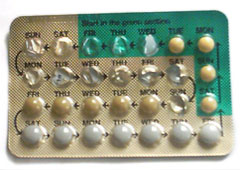
Image via Wikipedia
Oct 15, 2011, 03.19AM IST TNN![]() [ Kounteya Sinha ]
[ Kounteya Sinha ]
NEW DELHI: Advertisements, promoting morning-after pills, can be aired since the Drug Technical Advisory Board (DTAB) lifted the ban on October 10.
The embargo on advertising all emergency contraceptive pills (ECPs) was imposed in January, 2010.
Then, concerns had been raised that the ads were promoting the drugs as regular contraceptives and misrepresenting abortion.
The DTAB's latest guidelines say a committee, which would include the principal of a reputed girl's college, representatives from NGOs and the advertising council, can screen the ads and the scripts before they go on air.
No ways the ads can stigmatize abortion as an option, besides making it clear that the pills' side-effects include disruption of menstrual cycles.
The DTAB has suggested that both private firms and the Union health ministry to advertise and "promote EC pills so that the rural population are made aware of its availability".
The ads can promote the ECPs' use for emergency only. "The drug is safe for use in young as well as older women. It has no serious side-effects even after multiple uses. However, it should be promoted as emergency contraceptive only and not as regular means of contraception," the DTAB says.
"The DTAB's decision has been sent to the Union health ministry for notification," said a member of the Central Drugs Standard Control Organization (CDSCO). Seven companies market ECPs in India that have been available as over the counter (OTC) drugs since September, 2005.
India records 7 million abortions annually, and 20,000 women die because of abortion-related complications. Only two in five abortions are safe.
ECPs should be popped at the earliest, and not later than 72 hours after unprotected sex. Doctors advocate strongly against its indiscriminate use.
Around 8.2 million pills were sold in India last year. One of the most common misconceptions about the drug is that it is equivalent to an abortion pill. ECPs act as an interceptive agent and not an abortive one. Lack of proper knowledge about its functioning has led women popping them as regular oral contraceptives that are taken on a daily basis.
"It stops unwanted pregnancies in almost 855 of the cases. Unwanted pregnancies lead to unnecessary sufferings. There is a lack of adequate and safe abortion facilities, with at least 10 illegal unsafe abortions per legal ones," the DTAB says.
Experts said ECPs are comparatively heavier in dosage than regular oral contraceptives or birth control pills, and cannot be taken regularly as a family planning method.
The exact mode of action of ECPs is not known, but probable mechanisms include prevention of ovulation, fertilization and, or, implantation, depending on the phase of menstrual cycle when it is used.
The mechanisms for prevention of pregnancy are thought to happen before the implantation occurs. When used correctly - time and dose as prescribed - after a single act of unprotected sexual intercourse, the ECPs fail to prevent pregnancy in about 2% of cases.






No comments:
Post a Comment